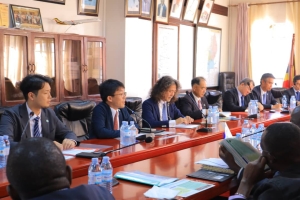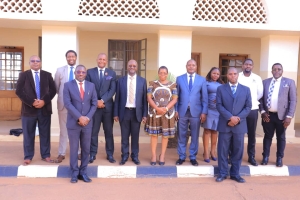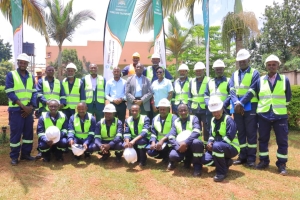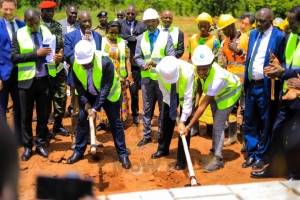Japanese Companies to share quality infrastructure knowledge with Ugandan Infrastructure Companies
A Japanese Delegation from the Ministry of Land, Infrastructure, Transport &Tourism (MLIT) and the Japan-Africa Infrastructure Development Association (JAIDA) has had a meeting with Infrastructure related MDAs and the Private sector in preparation for a high quality infrastructure technical officials meeting to be held on 5th December here in Kampala.
At this meeting, Ugandan companies and MDAs in infrastructure will get the opportunity to collaborate with Japanese companies for the exchange of skills and knowledge for improved infrastructure quality.
The Japanese Delegation earlier paid a Courtesy Call on the Hon. Minister of Works and Transport and briefed him of their interest in furthering cooperation with Uganda in regard to the development of infrastructure. The Hon. Minister informed them of the vast opportunities available in Uganda for cooperation with the Japanese Government and Private Sector Companies.
https://works.go.ug/component/k2/itemlist/user/298-webmaster?start=20#sigProId36a5e847f7
Uganda And Malawi Sign a Draft Bilateral Air Services Agreement
The Ministry in conjunction with Uganda Civil Aviation Authority (UCAA) on Tuesday 3rd October, held a high-level meeting with a delegation from Malawi’s Aviation Authority to negotiate the Bilateral Air Services Agreement (BASA) between Uganda and the Republic of Malawi.
The Draft BASA has been initialed by the Heads of Delegation from both States & consequently, a Memorandum of Understanding (MoU) on Air Transport Services between the two States has been signed.
The Uganda Delegation was headed by the Director of Transport, Benon Kajuna, and the Malawi Delegation was led by Ms Madabo Nyambose, the Principal Secretary of the Ministry of Transport and Public Works.
Preparations in High Gear for the Non Aligned Movement (NAM) Summit
The Head of Public Service and Chief Non-Aligned Movement (NAM) Organizer, Lucy Nakyobe inspected the Chinese-donated Saic Motors fleet, Indian-donated buses and the BMW Protocol Fleet ahead of the NAM Summit.
She was guided on the inspection by the Permanent Secretary, Bageya Waiswa, The Engineer in Chief Samson Bagonza, the Chief Mechanical Engineer Tony Kavuma and other technical officers.
Uganda will host the 19th Summit of the Non-Alligned Movement under the theme, “ Deepening Cooperation for Shared Global Affluence”.
During the summit to be held at Speke Resort Munyoyo in Kampala in January 2024, H.E the President of Uganda, Yoweri Kaguta Museveni will take over as the Chairman of the organization from President Azerbaijan Aliyev of the Republic of Belarus until 2026.
Uganda will also host the High Level International Summit of the Group of 77 Plus (China G77+China) in the same year.
https://works.go.ug/component/k2/itemlist/user/298-webmaster?start=20#sigProIdc5070907cb
Public Notice: Registration of Garages and Mechanics
Section 29 of the Traffic and Road Safety Act, 1998, Cap 361 As Amended Provides That a person shall not repair motor vehicles, trailers, or engineering plants unless he/she is in possession of a licence issued by the Chief Licensing Officer.
The Traffic and Road Safety (Licensing of Manufacturers and Garages) Regulations, 2023 Gazetted on 31st March 2023 provide for licensing of garages (vehicle repair facilities of any kind whether commercial or non-commercial) and accreditation of mechanics to ensure quality of service provision while repairing vehicles.
Accordingly, the public is informed that no person shall be permitted to operate a Garage without a licence issued by the Chief Licensing Officer.
The Ministry of Works and Transport therefore calls upon all garage owners/operators to register with the Ministry Not Later than 30th October 2023 so as to create a Database of Garages and Mechanics in the country to facilitate their subsequent accreditation and Licensing beginning 1st November 2023.
Registration forms can be accessed from the Ministry Website (www.works.go.ug/resources/publications) Or can be physically picked from the Ministry Head Office in Kampala (at former Transport Licensing Board offices) Or at any of the Regional PSV Licensing offices in Mbarara, Fort-Portal, and Mbale.
Completed Registration Forms may be either delivered to the same Ministry offices above or e-mailed to this Address: This email address is being protected from spambots. You need JavaScript enabled to view it.
For any Inquiries, you may call the following Telephone number during office hours.
Telephone: 0772 517164 (Principal Vehicle Inspector)
Stakeholders' Consultative Workshop to Validate Draft Final Report of Road Sector Development Programme (RSDP4)
The Ministry of Works and Transport hosted stakeholders from the road sector welcome at a highly significant Stakeholders' Consultative Workshop. The purpose of this workshop was to discuss and validate the Draft Final Report of the fourth Road Sector Development Programme (RSDP4), a pivotal initiative aimed at advancing the transport infrastructure in Uganda.
The Integrated Transport Infrastructure and Services (ITIS) Programme which encompasses Ministries, departments and agencies concerned with infrastructure and transport, seeks to establish a seamless, safe, inclusive, and sustainable multi-modal transport system. All interventions under the ITIS Programme are aligned with the development goals of the country, focusing on creating an enabling policy and regulatory environment, as well as developing essential physical infrastructure assets to improve livelihoods and foster economic growth.
Significant milestones have been achieved within the ITIS Programme to create an enabling policy and regulatory environment. These include the drafting of the Engineers Registration Bill, commencement of the URC amendment bill 2022, completion of Regulatory Impact Assessments for drafting various policies and laws, and the final stages of completing the National Integrated Transport Masterplan 2021-2040, among others. Additionally, progress has been made in preparing and reviewing regulations, standards, and guidelines to support the effective implementation of policies and laws.
To effectively implement the aforementioned policies and laws, the ITIS Programme requires robust planning frameworks as decision-making tools. Therefore, the Ministry, in collaboration with the African Development Bank, has prepared the Fourth Road Sector Development Programme (RSDP4). Aligned with various planning frameworks, including the NRM Manifesto 2021–2026, the Third National Development Plan (NDP III), and the National Integrated Transport Master Plan NITMP (2021-2040), RSDP4 aims to achieve improved transport connectivity, promote local construction industry and private sector participation, facilitate inclusive and sustainable growth, encourage research and development, determine future investment needs, enhance monitoring and evaluation, and identify necessary road development and maintenance interventions.
However, that the previous Road Sector Development Programme, RSDP3, was not approved by Cabinet due to various reasons, including insufficient consultation with key stakeholders. Hence, it was imperative that this consultative workshop is held to ensure comprehensive stakeholder engagement in formulating RSDP4, which will subsequently be submitted for Cabinet approval.
The consultative workshop was seeking the stakeholders technical feedback and opinions, crucial to the development of an evidence-based Road Sector Development Programme that will guide road development in Uganda.
Launch of Parish Development Model (PDM) Pillar 2: Infrastructure and Economic Services Operation Manual
Today marks a significant milestone as the Parish Development Model (PDM) Working Group unveils the Infrastructure and Economic Services Operation Manual for Pillar 2. The PDM, a comprehensive development strategy conceived under the Third National Development Plan (NDP III) of Uganda, aims to accelerate the decentralization process, uplift household incomes, and enhance the quality of life for the substantial percentage of Ugandan households still entrenched in subsistence livelihoods.
Pillar 2, Infrastructure and Economic Services, spearheaded by the Ministry of Works and Transport, in collaboration with the Ministry of Energy and Mineral Development, plays a pivotal role in ensuring the provision of reliable infrastructure and economic services for production and marketing. The key ministries associated with Pillar 2 include the Ministry of Water and Environment, the Ministry of Information, Communication and Technology, and National Guidance, the Ministry of Local Government, and the Ministry of Lands, Housing, and Urban Development.
The Minister of Works and Transport, Gen. Katumba Wamala while launching the Operation Manual remarked that the Government of Uganda is committed to the implementation of the Parish Development Model development strategy to ensure that all Ugandans are uplifted into the country’s money economy.
“It is therefore important to the Government to have all MDAs and LGs actively participating and supporting the implementation of key Government programs, all the 7 Pillars complement each other hence the need to have all pillar activities guided, to ensure that they all work towards a common goal,” added the Minister.
As part of Pillar 2's implementation, a set of ten activities have been identified, each led by its respective Key Pillar Ministry. The role of the Pillar 2 Working Group is to ensure alignment between budgets, work plans, and the Pillar 2 activities. The PDM approach adopts a bottom-up methodology, empowering communities to identify their needs, thereby guiding the planning and budgeting cycles of the Pillar Ministries.
On his part, the Engineer in Chief noted that budget constraints are a great impediment to the implementation of the PDM.
“The issue of funding the essential infrastructure developments under the PDM Pillar 2 requires revisiting. The Ministry of Finance, Planning and Economic Development communicates budget ceilings, year in year out. Unfortunately, these budget ceilings keep reducing to the extent that they are now budget floors. The basic infrastructure developments required for PDM will not be achieved if we are implementing with floors instead of ceilings,” said Eng. Samson Bagonza.
The Pillar Operation Manual, being launched today, contains detailed Activity Implementation Action Plans, which will coordinate and guide the implementation of the pillar activities to ensure that they remain on course to the attainment of the desired goal.
About the Parish Development Model (PDM):
The Parish Development Model (PDM) is a development strategy devised under Uganda's Third National Development Plan (NDP III). It aims to deepen the decentralization process, uplift household incomes, and enhance the quality of life for Ugandan households still reliant on subsistence farming. The PDM operates through seven interdependent Pillars, each with specific objectives and activities, to drive inclusive and sustainable development at the grassroots level.
The Government development strategy seeks to improve incomes and the quality of life for the 39% of the households stuck in the subsistence economy. This percentage translates to 3 million households and 16 million people.
The Parish Development Model (PDM) is a Government development strategy to improve incomes and the quality of life for the 39% of the households stuck in the subsistence economy. This percentage translates to 3 million households and 16 million people.
Pillar 2 Activities;
The Pillar Operation Manual contains detailed Activity Implementation Action Plans which will serve as a critical monitoring tool for the implementation of the Pillar 2 Activities;
- Construct & maintain accessible community roads
- Improve choke point/bridges on community roads
III. Establish & upgrade of Community markets
- Extension of safe water facilities for domestic use & production
- Extension of electricity facilities & other energy sources to communities, ensuring availability of power in each Parish
- Creation of free internet zones in Communities
VII. Increase internet coverage to communities
VIII. Development of appropriate e-services to support PDM
- Physical development planning to facilitate planned settlement
- Waste management
About Aircraft Accident and Incident Investigation Unit
Aircraft Accident Investigation is a state function, obligated by the International Civil Aviation Organization (ICAO) Convention to which Uganda is a signatory. The Aircraft Accident and Incident Investigation Unit is Uganda's national aircraft accident investigation agency. The unit investigates aircraft accidents and incidents
Eswatini Delegation Benchmarking Visit to Uganda
The Ministry of Works and Transport between the 2nd and 5th of May hosted a delegation from the Kingdom of Eswatini. Led by the Minister of Public Works and Transport, Chief Ndlaluhlaza Nhlonipho Celemusa, the delegation visited Uganda on a benchmarking visit to familiarize themselves with the establishment and mandate of the Uganda National Roads Authority and Uganda Road Fund.
Bageya Waiswa, the Permanent Secretary Ministry of Works and Transport welcomed the delegation to Uganda. He cited that the two countries have a lot in common including being land locked and having road transport as the dominant means of transport.
The Minister of Public Works from the Kingdom of Eswatini, Chief Ndlaluhlaza explained that the Eswatini Government is in the process of establishing a National Roads Authority and a Road fund and therefore saw it as pertinent to benchmark with Uganda so as to appreciate what it takes to set up and operate these bodies.
“We outsource most of the works for big road projects and greatly struggle with road maintenance, we realize that we share the same problems with Uganda and thus expect that the lessons learnt here will be practical and applicable back home,” said the Minister.
Hon. Musa Ecweru, the Minister of State for Works saw off the delegation at the end of their benchmarking exercise. He commended the two government’s great bilateral relations and appreciated their choice of Uganda for the benchmarking visit. He also asked them to apply as much as possible the lessons learnt and best practices while also pointing out areas that could use improvement on the Ugandan side.
The delegation from Eswatini expressed an interest in establishing a roads authority merged as one with a road fund since their government is discouraging the establishment of more government MDAs. The delegation held intensive meetings and discussions with the leadership of UNRA and the URF to learn more about their mandates and establishments.
The team also paid a visit to crucial infrastructure such as the Entebbe Expressway and the ongoing Kampala Flyover Project.
District Road Equipment Operators’ Skills Enhanced
Participated actively in the manual aspects of mechanics, operating the actual equipment.
49 Mechanical foremen from 6 Districts have undergone a 2 weeks hands on manual training on the proper utilization and maintenance of road construction equipment that was carried out in Wobulenzi, Luwero District. The training commenced on the 22nd of March, 2023 and concluded on Tuesday 4th April, 2023.
The participating Districts included, Amolatar, Kaberamaido, Koboko, Mayuge, Nakaseke, Lango Community and Luwero District. The training was the first skills enhancement to take place after the extended break following the Covid-19 Pandemic.
The Ministry’s Division charged with the mandate of training has been receiving too many requests for training opportunities.
The training Coordinator, Assistant Commissioner Mechanical Inspection, Eng. Winnie Naluyinda, emphasized the need to have more frequent trainings with greater numbers of participants citing the overwhelming number of calls and requests received by her Division .
“There is a great need, the demand is very high with people hungry for knowledge both in the District Local Government and other communities”, explained the Training Coordinator.
The District Engineer Luwero, Eng.Patrick Zziwa was present at the ceremony to pass out the trainees and expressed gratitude on behalf of the District local government and the community.
The District Engineer commended the works of the training coordinator and gave thanks for the work that has been done in the District which included the rehabilitation and the opening up of roads in the District.
The participants were trained in the operations of machines including Motor graders, wheel loaders, water-bowsers, dump trucks, excavators-, bulldozers, back hoes and the vibro-roller. The activities that the participants engaged in included grading, bush clearing, leveling, swamp crossings, offshoots for runoff water.
The Chief Mechanical Engineer, Eng. Tony Kavuma was present at the closing ceremony where he noted that the skills that the participants had attained are key in the implementation of the Parish Development Model which will require good roads in the communities to transport the agricultural produce.
He added that the government is well aware of the current equipment inadequacy in the main zonal centers and is trying very hard to not only boost capacity but also build up the stock of the mechanical equipment.
https://works.go.ug/component/k2/itemlist/user/298-webmaster?start=20#sigProIdebcf7f8d23
Uganda to Receive its First Mechanical Engineering Training Centre by January 2024
Through a grant from the Government of Japan, the Ministry of Works and Transport has commenced the construction of a Mechanical Engineering Training Centre in Kakizi, Luwero District.
The Minister of Works and Transport, Gen. Katumba Wamala and the Japanese Ambassador to Uganda H.E Hidemoto Fukuzawa, broke ground for the construction of this training center on the 5th of April, 2023.
The ground breaking ceremony was of great significance as the Mechanical Engineering Training and Advisory Centre (METRAC) as it has been named, will be Uganda’s first mechanical engineering training center. The project’s primary objective is to address the skills gap for the operation and maintenance of road construction equipment which also will greatly improve the problem of youth unemployment in the country.
The Government of Uganda secured grant aid from the Government of Japan for establishment of a training center, the grant was under a category that required a 3rd party implementing agency which in this case was the United Nations Industrial Development Organization (UNIDO).
The Ministry subsequently organized a signing ceremony of the Exchange of Notes between the Government of Japan and UNIDO on 8th August 2019 of which the Hon. Minister personally presided and later signed the project document between UNIDO and the Ministry on 26th October 2021.
In 2017, the Government of Uganda invested USD 155 million to purchase a total of 1,151 units of road equipment from Japan in an effort to improve the district road network. With this huge investment in road construction equipment both in Government and the private sector, there was no commensurate effort in developing the human resource to operate and maintain the road equipment
The Chief Mechanical Engineer who represented the Permanent Secretary at the groundbreaking ceremony explained how the idea of constructing a training center was first conceived.
“The need for a training center arose following an understudy conducted in 2015 by Sumitomo Corporation, the suppliers of the road equipment from Japan and Komatsu Ltd the manufacturers. The two dispatched a team to understudy the causes of early equipment failure and frequent breakdowns which team discovered that the human factor was the biggest contributor to this problem”, explained Eng. Tony Kavuma.
He further explained that the Ministry then worked with Sumitomo Corporation and Komatsu and agreed that the solution to perennial machine breakdowns was to establish an operator training center to improve the quality of training in order to churn out skilled operators.
While the Japanese Government provided a grant, the Government of Uganda, purchased the 10 acres of land at Kakinzi Luwero on which the training center will be constructed. Additionally, the government provided the Trainer of Trainees who were trained and certified by the Directorate of Industrial Training-DIT. The Permanent Secretary’s speech also revealed that the Government has made a provision of Ushs. 1 billion in next FY’s budget for construction of a kitchen and cafeteria under phase 2 of the project.
“We stand here today to witness the groundbreaking of METRAC, Uganda’s first training center for road construction equipment operators. After the MoWT bought this land, we have done a topographic survey and geotechnical investigations, we have drilled boreholes and I am being told that the technical staff of MOWT and UNIDO had many discussions on the procedure and way forward in their Technical Committee,” remarked the UNIDO Country Representative, Bruno Otto Tokwiny.
He further explained that the project partners have developed a master plan for the site and detailed drawings for the buildings that will be built including a workshop to service the machines, several classrooms to train the operators, an administrative building for the instructors, and a gatehouse.
UNIDO, the implementing partner selected a construction company through an open international procurement process – Cornerstone Design and Engineering which is expected to have completed the construction works in the next 9 months.
https://works.go.ug/component/k2/itemlist/user/298-webmaster?start=20#sigProIdfff09c3ac7










